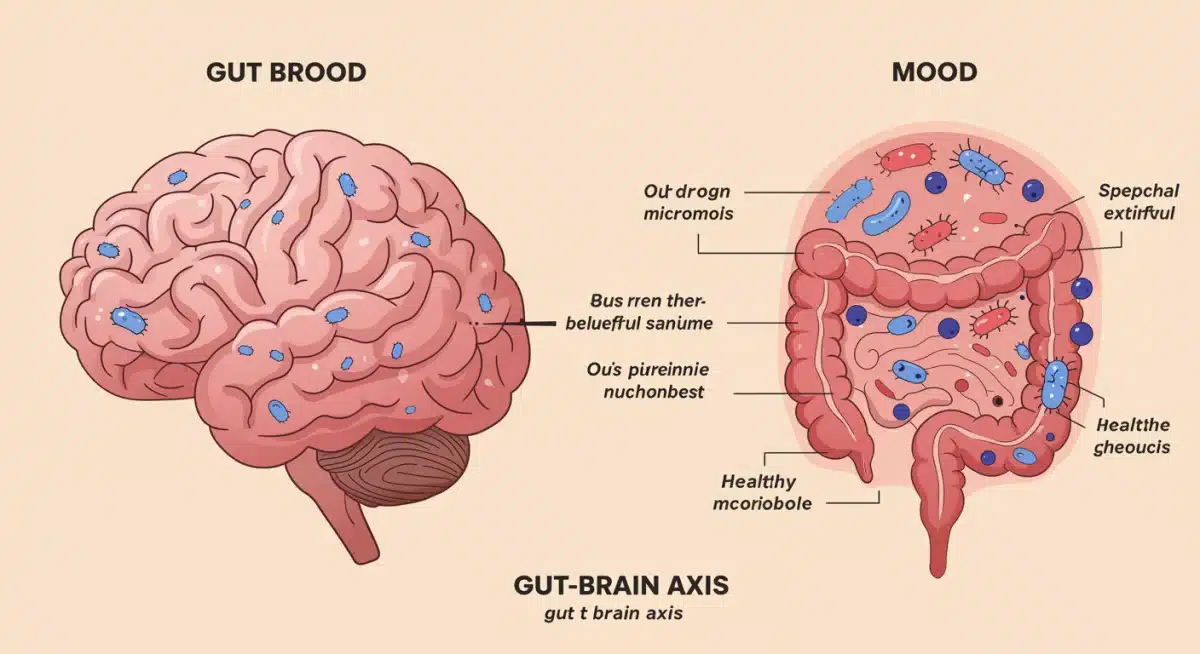Nutrition & Mood: 5 Dietary Adjustments for Women in 2025

Advertisements
For women in 2025, understanding the impact of nutrition on mood: 5 key dietary adjustments to enhance mental well-being (practical solutions, insider knowledge) is essential, as emerging research consistently highlights specific food choices that significantly influence emotional stability and cognitive function.
The Impact of Nutrition on Mood: 5 Key Dietary Adjustments for Women in 2025 to Enhance Mental Well-being (Practical Solutions, Insider Knowledge) is increasingly recognized as a cornerstone of overall health, directly influencing emotional states and cognitive performance. As we navigate 2025, new insights and verified data underscore the critical role that specific dietary adjustments play in supporting women’s mental well-being, offering actionable strategies to foster emotional resilience and cognitive clarity.
Understanding the Gut-Brain Axis and its Influence on Mood
The intricate connection between our gut and brain, known as the gut-brain axis, is a rapidly evolving area of scientific inquiry, particularly concerning its profound influence on mood. Research in 2025 continues to solidify the understanding that a healthy gut microbiome can significantly impact neurotransmitter production, which in turn regulates emotions and mental state.
This biological highway, involving millions of nerves and neurons, facilitates constant communication. The vagus nerve, for instance, acts as a primary communication channel, transmitting signals that can either soothe or agitate our central nervous system. When the gut is in dysbiosis—an imbalance of beneficial and harmful bacteria—it can lead to systemic inflammation, which is increasingly linked to mood disorders such as anxiety and depression.
The Role of Neurotransmitters in Gut Health
- Serotonin Production: Approximately 90% of the body’s serotonin, a key neurotransmitter for mood regulation, is produced in the gut.
- GABA Synthesis: Certain gut bacteria can produce gamma-aminobutyric acid (GABA), a calming neurotransmitter that helps reduce anxiety.
- Dopamine Pathways: Gut health influences dopamine levels, impacting motivation and pleasure, critical for a balanced mood.
For women, who often experience hormonal fluctuations that can affect both gut health and mood, optimizing this axis becomes even more crucial. Dietary choices directly feed the gut microbiome, making nutrition a powerful tool for maintaining mental equilibrium.
Dietary Adjustment 1: Prioritizing Omega-3 Fatty Acids for Brain Health
One of the most impactful dietary adjustments for women in 2025 to enhance mental well-being is the conscious prioritization of omega-3 fatty acids. These essential fats, particularly EPA (eicosapentaenoic acid) and DHA (docosahexaenoic acid), are vital building blocks for brain cells and play a critical role in reducing inflammation and supporting neuronal function. Their anti-inflammatory properties are particularly beneficial, as chronic low-grade inflammation is often implicated in mood disorders.
Studies consistently demonstrate that adequate intake of omega-3s is associated with lower rates of depression and anxiety. These fatty acids help maintain the fluidity of cell membranes, which is essential for efficient communication between brain cells. For women, who may face unique stressors and hormonal shifts, ensuring a steady supply of these nutrients can offer a protective effect on their mental health.
Key Sources of Omega-3s
- Fatty Fish: Salmon, mackerel, sardines, and trout are excellent sources of EPA and DHA. Aim for at least two servings per week.
- Flaxseeds and Chia Seeds: Plant-based sources provide alpha-linolenic acid (ALA), which the body can convert to EPA and DHA, though less efficiently.
- Walnuts: Another good plant-based source of ALA, beneficial for brain health.
Incorporating these foods regularly into your diet is a practical step towards improving brain function and stabilizing mood. For those with dietary restrictions or insufficient intake, high-quality omega-3 supplements, after consulting a healthcare provider, can also be considered to meet daily requirements and support nutrition mood women 2025 goals.

Dietary Adjustment 2: Enhancing Mood with Probiotics and Prebiotics
The second critical dietary adjustment involves actively fostering a healthy gut microbiome through the strategic intake of probiotics and prebiotics. As established, the gut-brain axis is a two-way street, and the composition of our gut bacteria profoundly influences our mental state. Probiotics are live beneficial bacteria, while prebiotics are non-digestible fibers that feed these good bacteria.
For women, gut health can be particularly sensitive to factors like stress, diet, and even hormonal changes. A balanced microbiome supports the production of key neurotransmitters and reduces gut inflammation, both of which are directly linked to improved mood and reduced symptoms of anxiety and depression. Integrating these elements into daily nutrition is a fundamental step towards enhanced mental well-being.
Incorporating Gut-Friendly Foods
- Fermented Foods: Yogurt, kefir, sauerkraut, kimchi, and tempeh are rich in probiotics, introducing diverse beneficial bacteria to the gut.
- Fiber-Rich Vegetables: Asparagus, garlic, onions, and leeks serve as excellent prebiotics, nurturing the existing good bacteria.
- Whole Grains: Oats and barley contain specific fibers that also act as prebiotics, promoting a thriving gut environment.
Making these foods a regular part of your diet can significantly contribute to better gut health, which in turn positively impacts mental well-being. This focus on the gut is an essential part of understanding the impact of nutrition on mood: 5 key dietary adjustments for women in 2025 to enhance mental well-being (practical solutions, insider knowledge).
Dietary Adjustment 3: Stabilizing Blood Sugar for Emotional Balance
Maintaining stable blood sugar levels is a crucial, yet often overlooked, dietary adjustment for women seeking to enhance their mental well-being. Fluctuations in blood glucose can lead to rapid shifts in energy, irritability, and heightened anxiety, creating a roller coaster effect on mood. When blood sugar drops too low, the body releases stress hormones like cortisol and adrenaline, which can mimic or exacerbate feelings of anxiety and panic.
For women, who may experience greater sensitivity to blood sugar changes due to hormonal cycles, managing these fluctuations through diet becomes even more vital. Consistently stable blood sugar provides a steady energy supply to the brain, supporting consistent cognitive function and emotional regulation. This is not about deprivation but about making smarter food choices that promote sustained energy rather than quick spikes and crashes.
Strategies for Blood Sugar Regulation
- Complex Carbohydrates: Opt for whole grains like brown rice, quinoa, and whole-wheat bread over refined carbohydrates.
- Protein with Every Meal: Protein slows down glucose absorption, preventing rapid blood sugar spikes. Include lean meats, fish, beans, or lentils.
- Healthy Fats: Incorporate avocados, nuts, and seeds to further stabilize blood sugar and increase satiety.
By consciously choosing foods that promote steady blood sugar, women can significantly reduce mood swings and improve overall emotional stability, contributing positively to their nutrition mood women 2025 goals. This balanced approach ensures the brain receives a constant, optimal fuel source.
Dietary Adjustment 4: Micronutrient Powerhouses: Vitamins and Minerals for Mental Health
The fourth critical dietary adjustment focuses on ensuring adequate intake of specific micronutrients—vitamins and minerals—that act as cofactors in numerous biochemical processes essential for brain function and mood regulation. Deficiencies in these key nutrients can manifest as fatigue, irritability, and even more severe mood disturbances, making their inclusion non-negotiable for optimal mental well-being in women.
Vitamins B, D, and magnesium are particularly noteworthy for their direct roles in neurotransmitter synthesis, nerve function, and stress response. For instance, B vitamins are crucial for the production of serotonin, dopamine, and GABA, while vitamin D is increasingly recognized for its impact on brain health and mood. Magnesium, often called nature’s relaxant, plays a role in over 300 enzymatic reactions, many of which affect the nervous system.

Essential Micronutrients and Their Sources
- B Vitamins (B6, B9, B12): Found in leafy greens, whole grains, eggs, and lean meats. Critical for energy metabolism and neurotransmitter production.
- Vitamin D: Obtained through sun exposure, fatty fish, and fortified foods. Essential for brain development and mood regulation.
- Magnesium: Abundant in dark leafy greens, nuts, seeds, and dark chocolate. Helps relax muscles and nerves, reducing anxiety.
- Zinc: Found in oysters, beef, pumpkin seeds, and lentils. Important for immune function and neurotransmitter balance.
Ensuring a diverse diet rich in these micronutrients is a foundational step in supporting mental health. In cases where dietary intake might be insufficient, tailored supplementation under professional guidance can help fill gaps and support the impact of nutrition on mood: 5 key dietary adjustments for women in 2025 to enhance mental well-being (practical solutions, insider knowledge).
Dietary Adjustment 5: Hydration and Limiting Processed Foods for Clarity
The fifth dietary adjustment involves two interconnected yet distinct practices: maintaining optimal hydration and significantly limiting the intake of processed foods. Both are fundamental for women aiming to enhance mental well-being in 2025. Dehydration, even mild, can impair cognitive function, leading to reduced concentration, fatigue, and irritability. Water is essential for all bodily functions, including those of the brain, acting as a medium for nutrient transport and waste removal.
Concurrently, the pervasive presence of highly processed foods in modern diets poses a significant threat to mental health. These foods are often high in refined sugars, unhealthy fats, and artificial additives, all of which can promote inflammation, disrupt gut health, and lead to blood sugar imbalances—a perfect storm for mood disturbances. Limiting them is not just about avoiding ‘bad’ foods, but about actively choosing options that nourish and support the body’s intricate systems.
Practical Hydration and Food Choices
- Consistent Water Intake: Aim for at least 8 glasses of water daily, increasing with activity or heat. Herbal teas and water-rich fruits also contribute.
- Whole, Unprocessed Foods: Prioritize fresh fruits, vegetables, lean proteins, and whole grains. These provide essential nutrients without harmful additives.
- Mindful Eating: Pay attention to food labels and choose items with minimal ingredients, focusing on nutrient density.
By consciously hydrating and significantly reducing processed food consumption, women can experience clearer thinking, sustained energy, and improved emotional stability. These simple yet powerful changes are critical components of any strategy focused on nutrition mood women 2025 and overall mental resilience.
Key Dietary Adjustment |
Impact on Mood & Mental Health |
|---|---|
Omega-3 Fatty Acids |
Reduces inflammation, supports brain cell structure, lowers depression/anxiety. |
Probiotics & Prebiotics |
Balances gut microbiome, enhances neurotransmitter production (serotonin, GABA). |
Stable Blood Sugar |
Prevents mood swings, reduces irritability, ensures steady brain energy. |
Key Micronutrients |
Supports neurotransmitter synthesis, nerve function, and stress response. |
Frequently Asked Questions on Nutrition and Mood for Women
While individual responses vary, some women may notice mood improvements within weeks of consistent dietary changes, especially regarding blood sugar stability and gut health. Full benefits often manifest over several months of sustained effort and nutrient repletion.
Ideally, nutrients should come from whole foods. However, supplements like omega-3s, vitamin D, or probiotics might be beneficial if dietary intake is insufficient or specific deficiencies exist. Always consult a healthcare professional before starting any new supplement regimen.
While nutrition is a powerful tool to support mental well-being, it’s rarely a standalone solution for severe mood disorders. Dietary adjustments should complement professional medical or psychological treatment, not replace it. Holistic approaches are most effective.
To enhance mood, women should minimize highly processed foods, excessive refined sugars, artificial sweeteners, and unhealthy trans fats. These can disrupt gut health, cause blood sugar spikes, and promote inflammation, negatively impacting mental well-being.
Even mild dehydration can lead to fatigue, headaches, poor concentration, and irritability, directly affecting mental clarity and mood. Adequate water intake ensures optimal brain function, nutrient transport, and waste removal, supporting cognitive and emotional balance.
What this means for Women’s Well-being in 2025
The emerging insights into the impact of nutrition on mood: 5 key dietary adjustments for women in 2025 to enhance mental well-being (practical solutions, insider knowledge) underscore a crucial shift in how we approach mental health. It signifies a move towards empowering women with actionable, science-backed strategies to proactively manage their emotional and cognitive states through daily food choices. This understanding is not just about avoiding deficits but about actively building resilience and fostering robust mental health. As research continues to evolve, staying informed and implementing these dietary adjustments will be paramount for women seeking to optimize their well-being in the coming years.





